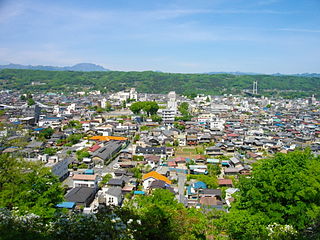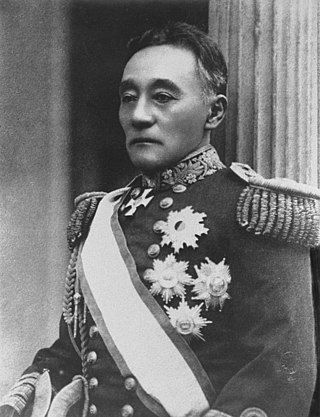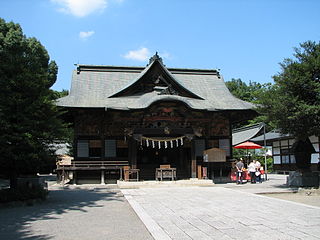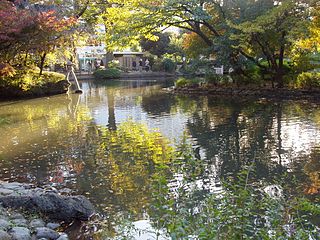
Chichibu is a city located in Saitama Prefecture, Japan. As of 1 January 2021, the city had an estimated population of 61,159 in 26,380 households and a population density of 110 inhabitants per square kilometre (280/sq mi). The total area of the city is 577.83 square kilometres (223.10 sq mi).

Minato is a special ward of Tokyo, Japan. It is also called Minato City in English.

The Minatomirai 21 Line, commonly known as the Minatomirai Line, is a subway line in Yokohama, Japan that runs from Yokohama Station to Motomachi-Chūkagai Station through the Minatomirai 21 business district. The line opened in 2004 and is operated by the Yokohama Minatomirai Railway Company.
Chichibu (秩父) may refer to:

Aoyama (青山) is one of the wealthiest neighborhoods of Tokyo, located in the northwest portion of Minato Ward. The area is well known for its international fashion houses, cafes and restaurants.

Chichibunomiya Rugby Stadium is a rugby union stadium located in the Aoyama district of central Tokyo, Japan. It is the spiritual home of Japanese rugby union and the headquarters of the Japan Rugby Football Union. Named for Prince Chichibu, the late brother of Emperor Hirohito, the venue is used mostly for rugby sevens and rugby union matches.

Yasuhito, Prince Chichibu was the second son of Emperor Taishō (Yoshihito) and Empress Teimei (Sadako), a younger brother of Emperor Shōwa (Hirohito) and a general in the Imperial Japanese Army. As a member of the Imperial House of Japan, he was the patron of several sporting, medical, and international exchange organizations. Before and after World War II, the English-speaking prince and his wife attempted to foster good relations between Japan and the United Kingdom and enjoyed a good rapport with the British royal family. As with other Japanese imperial princes of his generation, he was an active-duty career officer in the Imperial Japanese Army. Like all members of the imperial family, he was exonerated from criminal prosecutions before the International Military Tribunal for the Far East by Douglas MacArthur.

Count Kawamura Sumiyoshi, was an admiral in the Imperial Japanese Navy. Kawamura's wife Haru was the aunt of Saigō Takamori.

Setsuko, Princess Chichibu was a member of the Japanese imperial family and the wife of Yasuhito, Prince Chichibu, the second son of Emperor Taishō and Empress Teimei. Setsuko was a sister-in-law of Emperor Shōwa and an aunt by marriage of Emperor Akihito.

The Gakushūin, or Gakushuin School Corporation (学校法人学習院), historically known as the Peers' School, is a Japanese educational institution in Tokyo, originally established as Gakushūjo(学習所) to educate the children of Japan's nobility. The original school expanded from its original mandate of educating the social elite and has since become a network of institutions which encompasses preschool through tertiary-level education.
The first Japanese students in the United Kingdom arrived in the nineteenth century, sent to study at University College London by the Chōshū and Satsuma domains, then the Bakufu (Shogunate). Many went on to study at Cambridge University and a smaller number at Oxford University until the end of the Meiji period. The primary motive for this was an effort to modernise Japan in the long run. Since the 1980s, Japanese students in the United Kingdom have become common thanks to cheaper air travel.

Takanawa (高輪) is a neighborhood in Minato, Tokyo, Japan.
Group Tamashii is a Japanese comedy rock band. It was started by actors in a theatrical company called "Otona Keikaku" in 1995. Its original members were Hakai, Boudou, and Baito Kun. When it started, the group was just a group of comedians using the guitar. The members perform in many theaters, and also at Shōten. In 1997, bass, guitar, and drum players join and became a band. In 2002 they released their debut album called Run Tamashi Run (Run魂Run) while they were signed to an indie label, "MIDI". In 2005, Group Tamashi signed to Ki/oon Records. The name of the band derives from the song "Tamashi Kogashite" of the rock band ARB. The reason they put the "Group" in the band name is "Nobody didn't say 'Group' by myself." In 2008 they released a long-awaited new album entitled "Patsun Patsun". It was their longest album to date, at 27 tracks, and featured them covering a new variety of musical genres such as reggae and hip-hop. 2010 marks the group's 15th anniversary, and several releases and events are scheduled in honor of it, including a new album entitled 1!2!3!4!.
Yoshikazu Okada, born February 27, 1901, in the Aoyama area of Tokyo's Minato Ward, also known as Kōtama Okada, was the founder of a new religious movement in Japan (Shinshūkyō) generally referred to as Mahikari.

The Chichibu Shrine is a Japanese Shinto shrine at Chichibu in Saitama Prefecture.
The current line of succession to the Chrysanthemum Throne is based on the Imperial Household Law. At present, only direct male-line males are allowed to ascend the throne.
The Japan–British Society was founded in 1908 "to encourage the study of things British and to promote cordial relations between the peoples of Great Britain and Japan." It is the oldest bilateral organization in Japan, promoting international cooperation and exchanges.

Arisugawa-no-miya Memorial Park is a park located in Minami-Azabu, Minato, Tokyo, Japan. It covers an area of 67,131 square metres.
Haru is a Taiwanese Hokkien television drama that began airing on TTV Main Channel in Taiwan on 7 May 2015, from Mondays to Fridays, and ends on 21 July 2015, with a total of 54 episodes.
Events in the year 1902 in Japan. It corresponds to Meiji 35 (明治35年) in the Japanese calendar.













